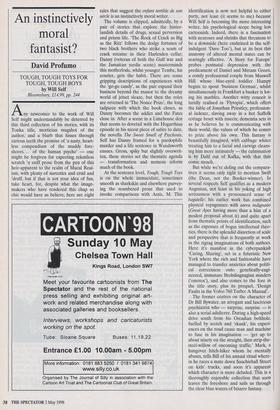An instinctively moral fantasist?
David Profumo
TOUGH, TOUGH TOYS FOR TOUGH, TOUGH BOYS by Will Self Bloomsbury, £14.99, pp. 244 Any newcomer to the work of Will Self might understandably be deterred by this third collection of his stories, with its Tonka title, mortician mugshot of the author, and a blurb that hisses through carious teeth the promise of 'a nasty, heart- less compendium of the muddy fore- shores... of the human psyche' — one might be forgiven for expecting relentless scratch 'n sniff prose from the pen of this heir-apparent to the realm of Mucal Real- ism, with plenty of narcotics and crud and 'druff, but if that is not your idea of fun, take heart, for, despite what the image- makers who have rendered this chap so chic would have us believe, here are eight tales that suggest the enfant terrible de son siecle is an instinctively moral writer.
The volume is clipped, admittedly, by a pair of stories that explore the hinter- landish details of drugs, sexual perversion and prison life. 'The Rock of Crack as Big as the Ritz' follows the dodgy fortunes of two black brothers who strike a seam of crack cocaine in their Harlesden cellar; Danny (veteran of both the Gulf war and the Jamaican yardie scene) masterminds this motherlode, whilst younger Tembe, his courier, gets the habit. There are some gripping descriptions of experiences with the to-go candy', as the pair expand their business beyond the manor to the dreamy world of jetset sleaze, but then the roles are reversed in 'The Nonce Prize', the long tailpiece with which the book closes, as Danny becomes the addict and the Fates close in. After a scene in a Limehouse den that seems to dovetail with the Hogarthian episode in his nicest piece of satire to date, the novella The Sweet Smell of Psychosis, Self has Danny framed for a paedophile murder and a life sentence in Wandsworth ensues. Gross, spiky but slightly overwrit- ten, these stories set the thematic agenda — transformation and nemesis inform much of the book.
At the sentence level, Tough, Tough Toys is on the whole immaculate, sometimes smooth as sharkskin and elsewhere purvey- ing the scumbered prose that used to invoke comparisons with Amis, M. This identification is now not helpful to either party, not least (it seems to me) because Will Self is becoming the more interesting writer, his psychological scope being less cartoonish. Indeed, there is a fascination with neuroses and shrinks that threatens to be a downside (here enshrined in the self- indulgent 'Dave Too'), but at its best this anatomy of altered mental states can be searingly effective. 'A Story for Europe' probes postnatal depression with the predicament of Daniel and Miriam Green, a comfy professional couple from Muswell Hill whose blue-eyed toddler Humpy begins to spout 'business German', whilst simultaneously in Frankfurt a banker is los- ing his marbles. Another witty conceit is luridly realised in `Flytopia', which offers the fable of Jonathan Priestley, profession- al indexer, slaving away in a hot Suffolk cottage beset with insects; dementia sets in as he believes he is communicating with their world, the values of which he comes to prize above his own. This fantasy is beautifully imagined, with cabbage whites treating him to a facial and earwigs cleans- ing him more intimately — the culmination is by Dahl out of Kafka, with that thin comic stench.
But while we're doling out the compara- tives it seems only right to mention Swift (the Dean, not the Booker-winner). In several respects Self qualifies as a modern Augustan, not least in his yoking of high seriousness with a pronounced sense of bagatelle: his earlier work has combined physical repugnance with saeva indignatio (Great Apes having more than a hint of a modest proposal about it) and quite apart from thematic points of identification, such as the exposure of bogus intellectual theo- ries, there is the splendid distortion of scale and perspective that is frequently at work in the zigzag imaginations of both authors. Here it's manifest in the cyberpunkish `Caring, Sharing', set in a futuristic New York where the rich and fashionable have managed to transfer anxieties about politi- cal correctness onto genetically-engi- neered, immature Brobdingnagian minders (`emotos), and also comes to the fore in the title story, plus its prequel, 'Design Faults in the Volvo 760 Turbo: A Manual'.
The former centres on the character of Dr Bill Bywater, an arrogant and lascivious psychiatrist who — surprise, surprise — is also a serial adulterer. During a high-speed drive south from his Orcadian bolthole, fuelled by scotch and 'skunk', his experi- ences on the road cause man and machine to fuse in his imagination — 'get up to about ninety on the straight, then strip-the- steel-willow of oncoming traffic.' Mark, a hungover hitch-hiker whom he mentally abuses, tells Bill of his annual ritual where- in he races a mate down Sauchiehall Street on kids' trucks, and soon it's apparent which character is more deluded. This is a thoroughly enjoyable collection that soon leaves the foreshore and sails us through the clear blue waters of bizarre fantasy.


























































 Previous page
Previous page